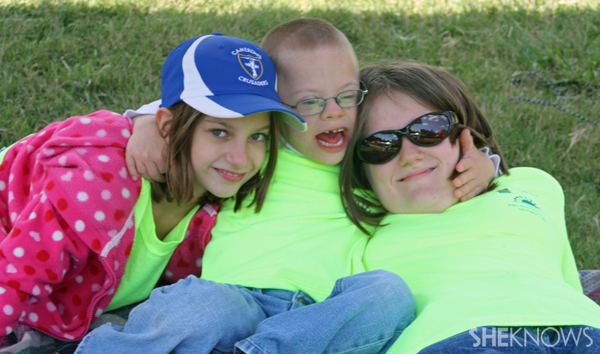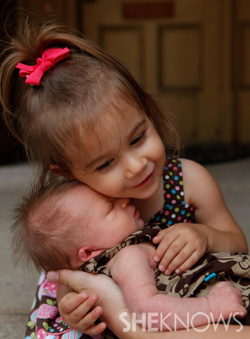
Children with special needs sometimes demand more of their parents’ time. So, how do you make sure their siblings don’t feel overlooked? Make sure your children who are developing typically have their own time with Mom and Dad to feel special too.
Equal love,
unequal time?
The truth is, at one time or another, every child feels overshadowed. Maybe an older sister continually earns As in school. Maybe a younger brother excels on the soccer field. Really, feeling a little alone and perhaps left out is, well, a part of life. We all have those feelings now and again.
Battling self-imposed guilt
What’s different for parents of children with special needs? The amount of time spent with the child who needs extra help sometimes can weigh heavily on a parent’s mind. Guilt can seep over us slowly like thick, paralyzing slime.
Larissa has year-old twins: A boy and a girl. Her son has Down syndrome.
“It hurts my heart when [my daughter] tries to slide in between [my son] and I during one of his therapies to get attention," Larissa shares. "I always fear that she feels left out.”
Recently, her son has spent time in the hospital, which compounds the emotions Larissa wrestles with daily. “It kills me when… she is home with my husband. I miss her so bad and worry that she does not understand why I am not there with her. I have constant guilt and wonder how I can meet both of their different needs and worry that she is being left out.”
Give kids credit — and private time
Unfortunately, as parents, we routinely project feelings of guilt onto ourselves. The good news? If we’re good, kind, loving parents, then our kids likely won’t notice a substantial difference in time spent with each child or they really will understand why a sibling needs more attention or time.
“Most brothers and sisters come to understand that their sibling with Down syndrome might necessitate more attention from their parents,” explains Dr. Brian Skotko, who has a sister with Down syndrome.
Dr. Skotko is a board-certified medical geneticist and also co-director of the Down Syndrome Program at Massachusetts General Hospital. He and Susan P. Levine published a book titled, Fasten Your Seatbelt: A Crash Course in Down syndrome for Brothers and Sisters.
“Parents should feel comforted knowing that siblings don't equate fairness with equal private time with their parents,” Dr. Skotko counsels. “Instead, brothers and sisters… want to have their own private moments with their mother and/or father, even if the time is not as intense or long as required by their sibling with Down syndrome.”
It seems the formula for helping our children feel equally loved isn't about counting minutes on a clock but rather directing an equal amount of adoration at each child, individually.
Next up, parents share six tips to keep the peace, keep your sanity — and keep your sense of humor .
Schedule one-on-one time
Make sure each child gets one-on-one time with each parent. Separate, and special! This is advice for all parents, not just those who happen to have one child with special needs.
I still remember special dinners with my mom at a very grown-up restaurant ; likewise, the time I spent with my dad in my college years, driving up and down the East Coast, often was filled with silence , but the time alone was meaningful and cherished.
Brandi shares the struggle she encountered with her oldest daughter when her newborn, who has Down syndrome, began therapies. "The attention was not focused on her anymore," Brandi explains. "I try to do 'mommy-and-[daughter]' things together by ourselves when possible."
Distribute adoration in large doses

Shower love. Scrub in some extra time. Wash, rinse and repeat.
“Communicate how much you love each child,” says Susanna, who has raised four children with her husband. Her oldest, a son named Graham, is 26 and has Down syndrome. She describes a game she played with each of her children.
"I used to say, 'I love you the mo-o-o-o-o-ost of a-l-l-l-l the world,'" she says, drawing out each word for emphasis and dramatic effect. "'The mo-o-o-o-o-o-ost!' And I'd say it with a big smile and a big hug. Then I would turn to the next child and say, 'No, I love yo-o-o-o-u the mo-o-o-ost in all the world!'
This deliberate and emphatic focus helped the children realize "I couldn't possibly love them more and it was exactly the same for their siblings... It was like a little celebration, and for a moment, they felt like the only one."
Create a condition!

Why should only one child have a medical diagnosis? When it comes to conditions, the more the merrier!
Kathryn shares her tongue-in-cheek story: “I think that siblings of kiddos with special needs definitely feel left out sometimes. There is a delicate balance between the typical sibling feeling like their sibling [with special needs] gets more attention, but then also being pleased that they have more freedoms than their sibling [with special needs].
“My girls were so happy to have a diagnosis of their own. When [daughter K] was diagnosed with ADHD, she said, ‘Yes! Now I have something, too!’ Like having [Down syndrome] had been a goal of hers! [Daughter B] kept asking what she had, until I finally told her, ‘You worry a lot so you probably have anxiety issues.’”
“…My favorite is when [daughter B] says, ‘[My sister's] ADHD is annoying my anxiety issues.’”
Support individuality

Encourage, nurture and then fiercely protect each child’s interests .
Jenn’s children are 22 months apart. Her daughter often is included in her son’s therapy sessions — all part of helping her little brother “become a big boy like she’s a big girl.”
“I’d say school really helped [her] have a sense of something that was [and] is just hers," Jenn reflects. "[Suddenly,] she had her own time, her own friends, her schedule... We’ve always made sure that when she has big things going on, they’re about her with no interruptions from [her brother].”
Inclusion may not be the best, all the time
Susanna recognized during her sons’ middle school years that her second eldest son, Malcolm, was starting to notice the attention his older brother, Graham, received, even from his own friends. “They all wanted to high-five Graham,” she shares with a quiet laugh.
After considering multiple factors, such as wanting Graham to have peers like him, Susanna and her husband decided it was time for Malcolm to “have a complete space from everyone always being focused on Graham."
"... He was young enough to still feel crowded by [the attention given Graham] and still immature enough to need the world to be about him.” While the boys had been in the same grade to that point, that year, Graham moved into a separate program.
Susanna says the positives of having Graham as an older brother for his three siblings outweigh any momentary challenges or “blips” during their childhoods.
“They’ve been much more able to see other people who have special needs and respect them as people who have emotions and strengths,” Susanna says proudly.
Finally… quit overthinking!
So, you’ve done the one-on-one time. Each child has his or her own special hobbies or extracurricular activities. Heck, you’ve named stars in the universe after each child .
Still, the nagging doubts tug at your heart and tighten in your throat. Am I doing enough? You ask. That’s when it’s time to take a breath.
“Do you think we ‘overthink’ this?” asks Sandy, who has three children under age 2. “What did our great-grandmas do? … Are we predisposing our kids to feel ‘left out’ when they will be just fine? Do we do things because we feel guilty?”
Sometimes, there is no clear answer. But parenthood does come with several guarantees:
- The last baby wipe in the bucket will be the first one you grab to fight off a poopy diaper.
- Your child will puke down your shirt in public places only, when you are wearing a dress and have no spare in the car.
- Teachers’ notes informing you of your duty to bring snacks will slide mischievously into the darkest crevices of your child’s backpack.
- And you will feel guilty. For life.
Remember, who said life is fair?
My Dad had an expression he used generously during the years when my brother and I would wrestle for the left Atari remote . It was simple, to the point and exceedingly effective.
“Can it,” he would bark.
And generally, the quarrel would be canned. He didn’t evaluate the situation to determine justice. He merely put an end to the squabble.
“I grew up the middle child with a sibling with special needs and my parents tried hard to give us all what we needed and all attention,” Jill shares. “It wasn't always exactly the same because every child has different needs.
“It did teach me that fair isn't always equal and equal isn't always fair. Life is about balance with all children and our children are more alike than different, right?”
More about sibings
Coping with sibling rivalry
Bridging the sibling gap
Having a sibling with Down syndrome